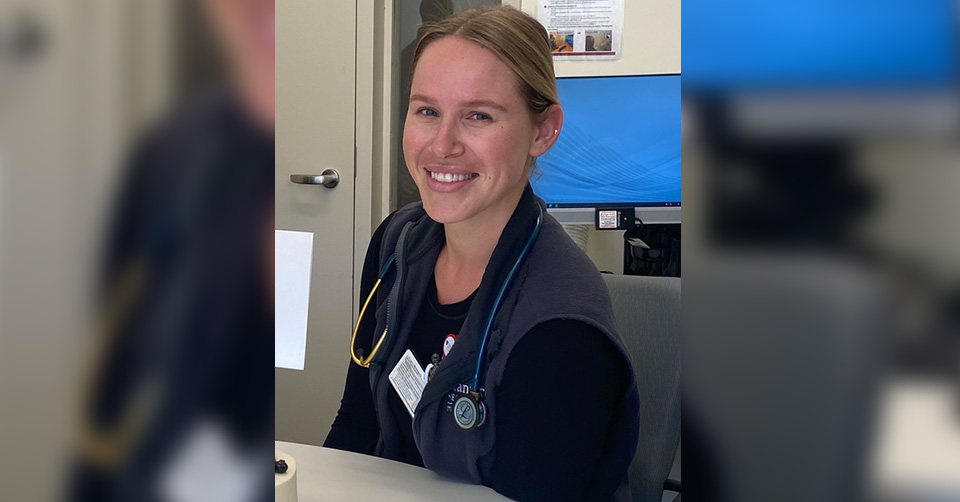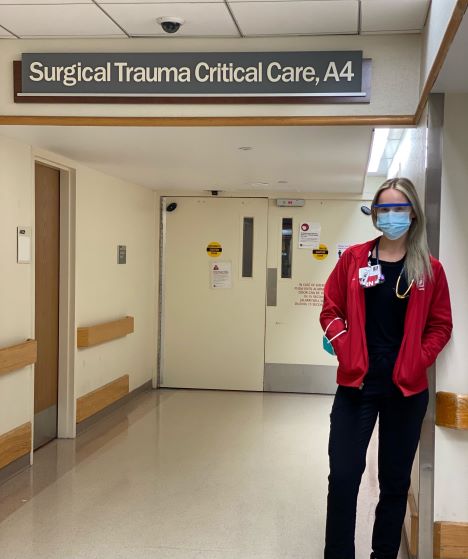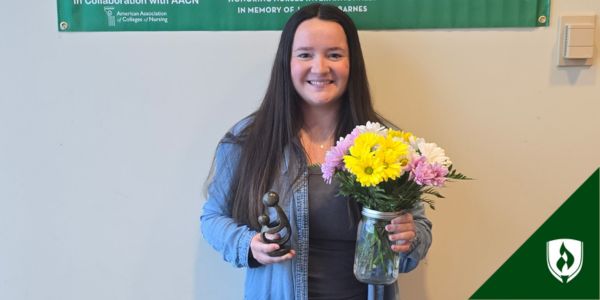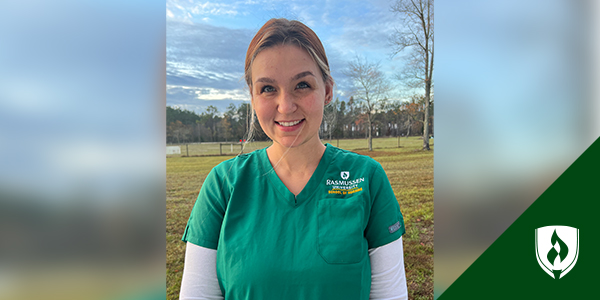BSN Grad and Traveling Trauma Nurse Helps Patients Across the Country
By Hannah Meinke on 03/09/2023

“I like to joke and say I was born into the medical field,” Colby Snyder says. With both parents working in medicine, it’s no wonder that Colby is now a traveling ICU nurse. She has worked in trauma centers across the country and is earning a dual master's degree in nursing. But the path hasn’t always been that simple. Colby recalls visiting her dad’s pediatric surgery clinic as a kid and playing in the lobby. She’s always been interested in the medical field but wasn’t sure where she would fit in—until she found nursing. After earning her bachelor’s degree in biology, it was clear:
“I felt like nursing opened up more doors. There are so many different avenues you can take,” she says.
The Fast Track
In April 2017, Colby enrolled in the Rasmussen University accelerated BSN program in Overland Park, Kansas. In true trailblazer fashion, she was part of the very first cohort to enter the program.
“I just wanted to be in and out,” she says, “I didn't feel the need to be in school longer than necessary, and this program provided me the fastest route.”1
As any nursing grad will know, the program was challenging—especially being in the very first cohort.
“Make sure that you have a good schedule to manage your time, because it’s a lot of work,” she offers other nursing students. “You go to classes, but there's still so much that you have to do outside of class.”
Having the support of faculty was also key for Colby. One instructor in particular made a memorable impact.
“I literally would give my degree to Cynthia if I could. She really took me under her wing,” Colby says. “She'd check in on me. She was always there if I needed something and helped me study for the NCLEX™.2 I so appreciate her. We still keep in contact.”
Working Through the Pandemic

After graduating from Rasmussen University in December 2018, Colby started working in the largest trauma center in Indianapolis.
While critical care might seem like a lot to take on right after graduation, Colby says “I just knew I wanted to work in the critical care world. I feel like there's nothing more purposeful than an ICU.”
After completing a one-year residency at the hospital, Colby continued to develop her skills in the ICU. And then Covid hit. Like so many healthcare workers, Colby was put in an impossible situation. The patient-to-nurse ratios often doubled and staff bonuses were cut—leaving the staff overworked and underpaid.
This was a great time to re-evaluate career priorities. After a few years of consideration, Colby decided to become a travel nurse to pursue her passion of helping patients in critical need.
A Day in the Life
Though every day is vastly different in an ICU, Colby explains what one day might look like as a trauma nurse.
6:40 a.m. “At the hospital, our morning huddle starts at 6:40 and then at 7:00 we do a bedside hand- off.”
7:00 a.m. to 8:00 a.m. “Between 7:00 and 8:00, I go through my charting and get to know the patient on paper. I do an assessment and then take care of medications. Sometimes there are patients on CRRT [Continuous Renal Replacement Therapy] machines and every hour you have to monitor those numbers. Some patients are also on IV drips, and it's critical that I get that first assessment done and make sure there are no significant changes.”
8:30 a.m. “We do morning rounding with the resident physician assigned to the patient, the attending physician, the fellows, a pharmacist, a dietitian, and occasionally a social worker.”
9:00 a.m. “After rounding, I go about my day, depending on how the patients’ needs change. ”
1:00 p.m. “We have mandatory, 30-minute breaks. When I come back, I take care of whatever medications need to be done, and then we do an afternoon round—a simplified version of the morning round. But again, a lot of things are changing left and right.”
1:30 to 7:00 p.m. “I'm working with resident physicians throughout the day, taking patients to scans and doing other things they need. Hopefully everything goes steady and then we'll do a handoff to the next shift at 7:00 p.m.”
Taking Care of Caretakers
Colby spends a lot of time taking care of other people—like when she helped a woman who passed out at the election polls. If you know someone like Colby, you may have wondered how to support the person who spends their days helping others. She offers a simple suggestion:
“Learn to listen without giving advice. Sometimes you just want to vent,” she says, adding that small acts of service like offering to do the laundry, walk the dog or buy dinner can go a long way.
If you are thinking about becoming a nurse or working in the medical field, check out Rasmussen University’s nursing programs. Whether you were born into it or not, your hard work and compassion can make a life-changing difference.
1 Completion time is dependent on transfer credits accepted and the number of courses completed each term.
2 NCLEX is a registered trademarks of National Council of State Boards of Nursing, Inc.





